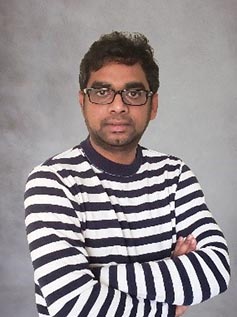
Name: Nageswara “Nagesh” Lalam, NETL Post Graduate Research Program Research Associate, Oak Ridge Institute for Science and Education.
Hometown: Visakhapatnam, India.
Education: Doctorate in electrical engineering, Northumbria University, Newcastle, UK; master’s in wireless communications systems engineering, University of Greenwich, London; bachelor of technology in electronics and communications engineering, Jawaharlal Nehru Technological University, Kakinada, India.
What’s your research project?
I am developing novel fiber-optic sensor systems for natural gas infrastructure monitoring.
The United States is home to roughly 400,000 miles of gas transmission pipelines, and every inch is susceptible to corrosion, ruptures, leaks and aging, which threatens the safety of our communities, poses a serious environmental risk and could result in millions of dollars in property damages in the event of a significant failure.
Current state-of-the-art solutions typically involve periodic inspections and point sensors rather than real-time monitoring over long distances of pipeline. Fiber optic sensor technology is a promising solution to address regional and global energy systems monitoring challenges.
My current research will develop and prototype novel distributed fiber optic sensor systems for real-time monitoring of parameters such as strain, temperature, methane and carbon dioxide concentration, vibrations in natural gas pipeline systems, and wellbore integrity across long interrogation distances up to 100 kilometers with one-meter spatial resolution. The distributed fiber sensor will provide 24/7 monitoring capabilities along the entire length of the fiber and forward alerts to pipeline operators before failures occur.
Tell us something interesting about yourself.
I spend time tinkering with Arduino and Raspberry Pi computer kits at home. I like to cook chicken biryani and Indian curries.
What is the most impactful or valuable thing that you have learned from your experience so far at NETL?
I enhanced my expertise in experimental investigations of novel fiber optic sensor systems, data acquisition systems and advanced data analytic methods with tremendous support from my NETL mentor, Michael Buric. I developed scientific skills in prototype/packaging optical fiber interrogators with an emphasis on field-test demonstration and received multidisciplinary support from the engineering team at NETL.
How will you be able to use what you’ve learned as you continue your education or enter the workforce?
My long-term goal is to transform laboratory research findings into commercial fiber sensing products designed for real-world industrial applications. The hands-on experience, research collaborations I have enjoyed at NETL and external academic collaborations will greatly benefit me in this endeavor.
How do you think your experience at NETL will help you make an impact in the energy sector?
I believe my research experience and development of novel distributed fiber optic sensors and real-time monitoring will directly impact new energy-generation technologies including wind, solar and geothermal power, as well as approaches for improving the safety of our existing fossil fuel systems.
How has your opinion of the fossil energy industry changed or been reinforced throughout the course of your experience at NETL?
We are finding more and more alternatives to fossil energy, including more renewable sources of energy such as solar, wind and hydropower to mitigate climate change and reduce greenhouse gas emissions. But how can the world economy survive without fossil fuels? And how does the world or the U.S. meet its vast energy needs without fossil fuels? Therefore, it is important that until the renewable energy goal is completely reached in many industries, fossil fuels will remain a necessary component of our combined energy production while dedicating research to improve efficiencies and reduce emissions of those nonrenewable energy industries.
What are some other benefits of becoming a research associate at NETL?
There are many. While at the Lab, I have been able to access leading researchers and scientists within the Sensors and Control Systems Research Group and one-of-a-kind equipment and facilities, including the materials coating laboratory and SEM (scanning electron microscopy) equipment and laboratory gas lines.
I also had the opportunity to collaborate with material scientists to develop various coating materials on optical fiber to enhance sensing sensitivity and selectivity.
In my time at NETL, I have authored five high-impact journal articles, developed one patent (pending) and participated in nine conference proceedings. I have given seven conference presentations.
In addition, NETL collaborates with researchers at top universities and in industry. I have collaborated with experts in the fiber sensors field at the University of Pittsburgh, OFS Inc. and GTI Energy.
Please share some information about what ignited your early interest in science. Was it a parent, a teacher, your participation in a science competition or some other experience?
During high school, I participated in a science fair competition, which allowed me to develop and present my project on magnetic propulsion moving a train. I used a toy train and was awarded second prize. This success and my curiosity about how things work around us motivated me and drove me toward a career in science.
Click here for more information about NETL internships.
 Return to Spotlights & Profiles
Return to Spotlights & Profiles





